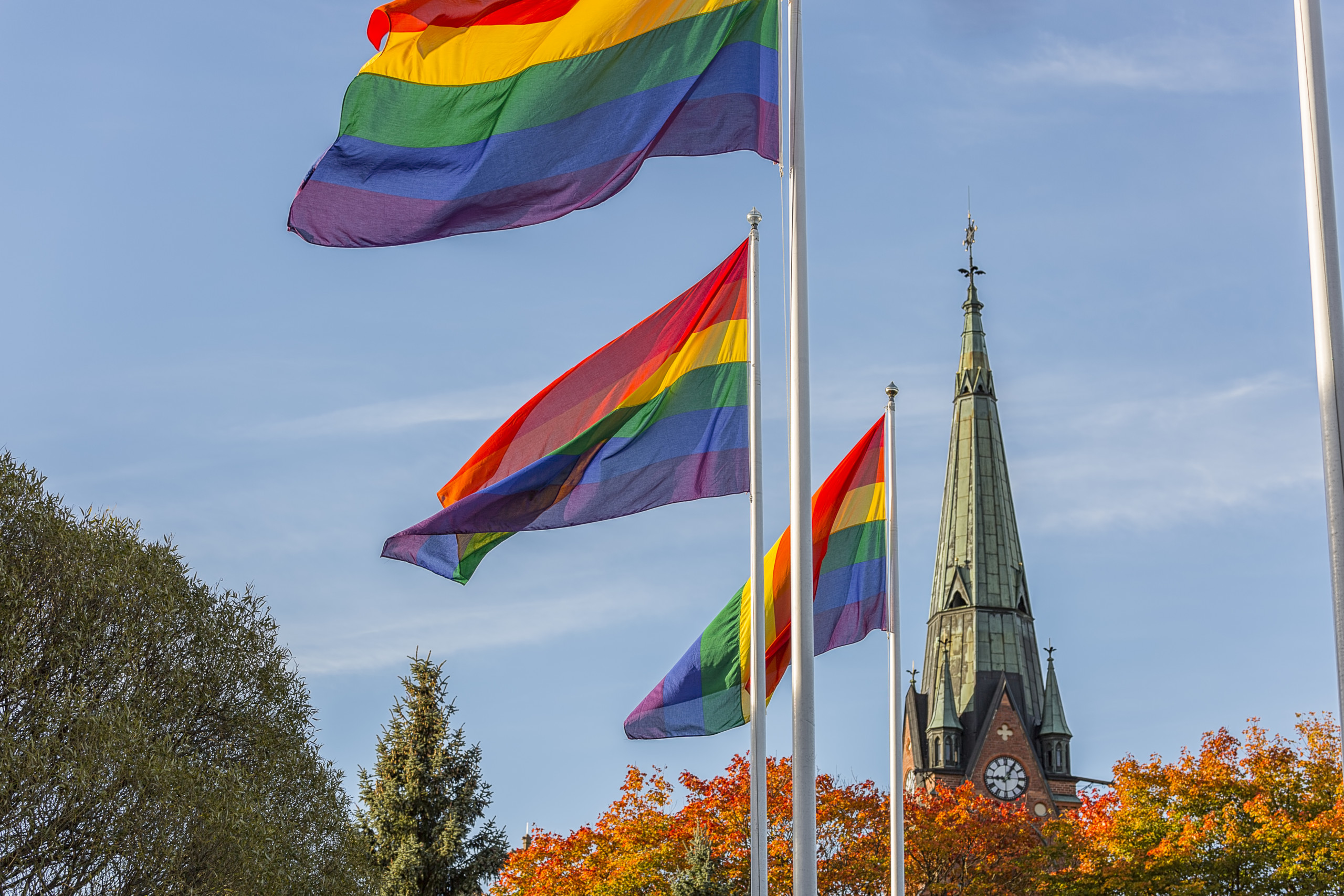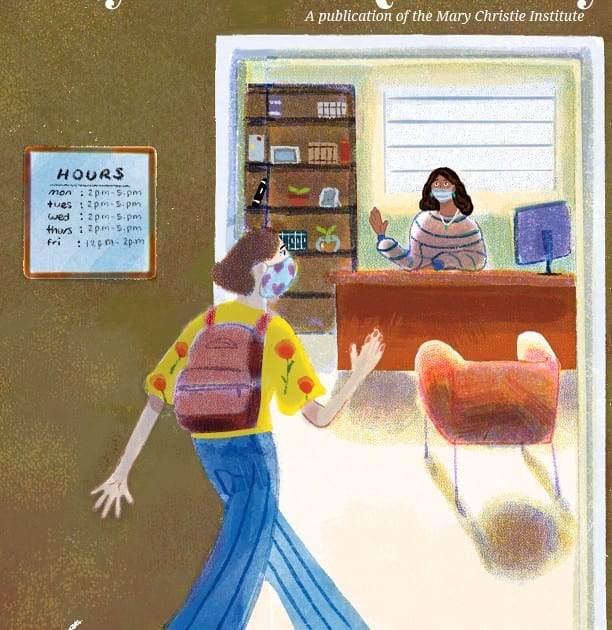Data show that trans students in college and university report higher rates of anxiety, depression, and suicidal ideation than their cisgender peers. And while the pandemic pushed distress numbers higher for all students, trans students’ mental health appeared to be particularly impacted. As UMass Amherst’s first hired trans mental health professionals, Aspen Alterkun (they/them) and Bradley Landon (they/them) support LGBTQIA+ students at the Center for Counseling and Psychological Health (CCPH) and talked with us about their experiences with this resilient group of students.
Prior to CCPH, Aspen worked at a community mental health clinic in New York City. As a clinician, Aspen is intentional about understanding students’ intersecting identities. They believe healing takes place “when we are truly seen and accepted by others, but especially by ourselves.” Aspen supports LGBTQIA+ students, running process groups, individual sessions, and family sessions.
Prior to CCPH, Bradley worked for queer and trans young people living with HIV in Florida. They currently facilitate a Trans and Gender Non-Conforming Support Group for students and facilitate a Trans History and Theory Clinical Team for clinicians.
MCI: What were some takeaways you noticed during the pandemic for trans student mental health? What difficulties did trans college and university students experience during this pandemic that perhaps other students did not?
Bradley: Well, isolation I’d say is the biggest. I think a lot of queer youth are coming to UMass Amherst. Western Mass is a very queer area. Coming from different parts of the country where they don’t necessarily have queer centers, they make friends on campus. When they had to go back home, students lost a lot of community.
Many of the young people I’m working with, particularly trans people, went back to homes that were conservative. Therefore, they either had to suspend any medical intervention, or even had to suspend the ways in which they identified, so that they could be able to cope in their homes.
I’ve seen a lot of young people who have had a really hard time navigating their home. I’ve also seen a lot of young people that have been really bold and down to deepen into their identity and themselves in ways that were profound because of the time that they have had to spend with their own internal world. I’m thinking also about accessibility and telehealth. There’s a lot of young people that were able to access mental health services in ways they couldn’t before because of Zoom. I think there’s something about telehealth opening up different ways of connecting. I see a lot of people in my group, but I’ve never seen their faces. They just come on with a name, and they engage in chat on the side. I don’t know if they would come to the group because they might be shy, or maybe feel it’s less accessible because they’re neurodiverse. What do you think, Aspen?
Aspen: I totally agree about increased access due to telehealth. Overall, there is a way that dysphoria can sometimes be decreased within this mode because you’re only being seen neck up, so there’s a certain amount of protection that can be granted. And that can then allow people to show up in certain spaces they maybe wouldn’t have otherwise.
The assault that is occurring on transgender young people, particularly around hormone blockers or hormone replacement therapy, or in some states where trans kids are outed, make it so that young people feel like they cannot imagine a future.
MCI: Data from the Healthy Minds Study and The Trevor Project show that gender minority students are significantly more likely to suffer from mental health issues, and more than half of transgender and non-binary youth report having seriously considered suicide.
What are the most common underlying factors that you think contribute to increased rates of mental health issues for trans students?
Bradley: Oppression is number one. I would say that actually covers everything. Currently, there is more anti-trans legislation that has happened within the last few months than in the last decade. The assault that is occurring on transgender young people, particularly around hormone blockers or hormone replacement therapy, or in some states where trans kids are outed, make it so that young people feel like they cannot imagine a future.
The AIDS epidemic in the ’80s killed off most of our trans elders. The AIDS epidemic, along with trans invisibility and oppression made it so queer and trans kids do not have a model to look at — to see themselves, to see what they look like in the future. So, there are no models of success. Queer and trans people do not have access to, or are not allowed into, professional spaces.
I also think that family rejection is one, but I think that state rejection is more prominent and more penetrative. A lot of young people can have supportive family environments but have an internalized rhetoric about themselves from political officials.
We’re already in June this year, and there have been more trans deaths than all of 2020. With the rise of visibility comes the rise of hate crimes. It doesn’t paint a picture of a happy, healthy future. I don’t know about you, Aspen, but I hear very regularly from trans young people that I am the first trans person they have met in a professional position. And so, they went their entire life so far without seeing someone who was trans and not their age, or in a precarious situation.
MCI: What are some of the effective practices you’ve noticed while working with college students that help them thrive? What are some of the ways colleges and universities can implement within their own institutions to improve trans student mental health?
Bradley: Hiring trans people.
Aspen: The first thing that comes to mind is the group that you’re running, Brad — the trans and gender-nonconforming group for students — and I’ll let you talk about that. Providing community spaces is important. The university has spectrum housing, which is LGBTQIA+ affiliated housing for students on campus within the dorms, so they can have a safer space. The RAs are also queer identified. I think that’s one option.
Bradley: There was such a large population of trans people that were being seen at CCPH. I became a part of it because I’m trans. It’s a group where mostly young undergrad folks just come and can speak freely without a lot of interruption from cis people or any sort of judgement. Therefore, they can have dialogues where they aren’t self-policing. They don’t have to code-switch about how they’re seen or heard.
Part of the reason why that exists is because UMass students organized along with the Stonewall Center to make sure that trans people were hired at CCPH. I think that trans people should be hired in all professions, but definitely in mental health fields — in the same way that all mental health fields should be able to speak to the mental health needs of people who are marginalized.
And there’s just so much to catch up on. When I’m initially thinking about, “What are the specific needs of trans young people?” The first thing that pops into my head, especially with the dearth of trans elders, is having a large awareness of trans literature or trans film because those things can operate as a source of models of how to be.
I facilitate a trans care team, which is a group of mostly cis clinicians who come and learn about trans theory and trans culture and history so that they can be more aware or position the young person within a historical context. If young people don’t know that we have a huge legacy of resistance or a huge legacy of resilience, they can feel sort of lost at sea. I think mental health providers having just a baseline knowledge of where we have existed through time, culture, art, etc. is an intervention.
Aspen: Simply, our existence on staff. We’re both relatively new folks working there, and we’re the first trans folks that UMass had hired for the counseling center. So, I think there’s room for more of us, and we definitely need more of us, but just even the presence, I think, has made a huge difference.
MCI: What are strategies that institutions can implement to support trans students returning this fall?
Bradley: I mean, I have a million things. Most of them are prefigurative. My brain says “reparations,” and I mean that for Black trans students. Or “free tuition.” I’m thinking about the housing we have, the dorm on campus, which is really hard to get into. Probably expanding queer and trans-specific spaces on campus, like dorm situations, would be really useful.
Something I would dream about would be identifying someone who works specifically with the families of trans people. There’s just a gap in knowledge, and I think that some of them want to be on the team, but don’t say the right things. Someone who has that medical-mental health interface too would be helpful.
There are a lot of parents that are really nervous about the social aspects of what transness means to their kid. There’s a lot of misinformation that is being passed around out there. Recently, a group of psychologists came up with this term called “rapid-onset gender dysphoria.” It’s this idea that kids go on the internet, see trans people, and through a social contagion, they suddenly become trans. The rapid-onset gender dysphoria is actually the backbone of a lot of the fear that’s driving the anti-trans legislation.
When they actually Google, “Is my kid trans,” the first thing that pops up is rapid-onset gender dysphoria. They are becoming really afraid that their kid is seeking medical interventions that are irreversible, and that those things are actually a social contagion. They think their children need depression care, and then that would sort that out.
If only they sat with someone who was a medical illness expert. I think that cis people can extend into the minds of cis people a lot more than trans folks can in some ways. But to sit with them and be like, “This is actually not a real thing. It doesn’t actually work like this. Your kid has felt this way for a long time and finally has language.”
Aspen: I was going to add that I hope to be collaborating with the Stonewall Center to offer a support group for trans staff this coming year, because I think that’s an important piece. If we want to keep staff able to work in this environment, where there are constant microaggressions happening, and sometimes worse, then we actually need to be able to find community with one another as well. Hopefully, that will be up and running this semester to support professors and librarians and all different kinds of folks around campus. Hopefully, we can connect with the student group in some way to create more models in the community.




